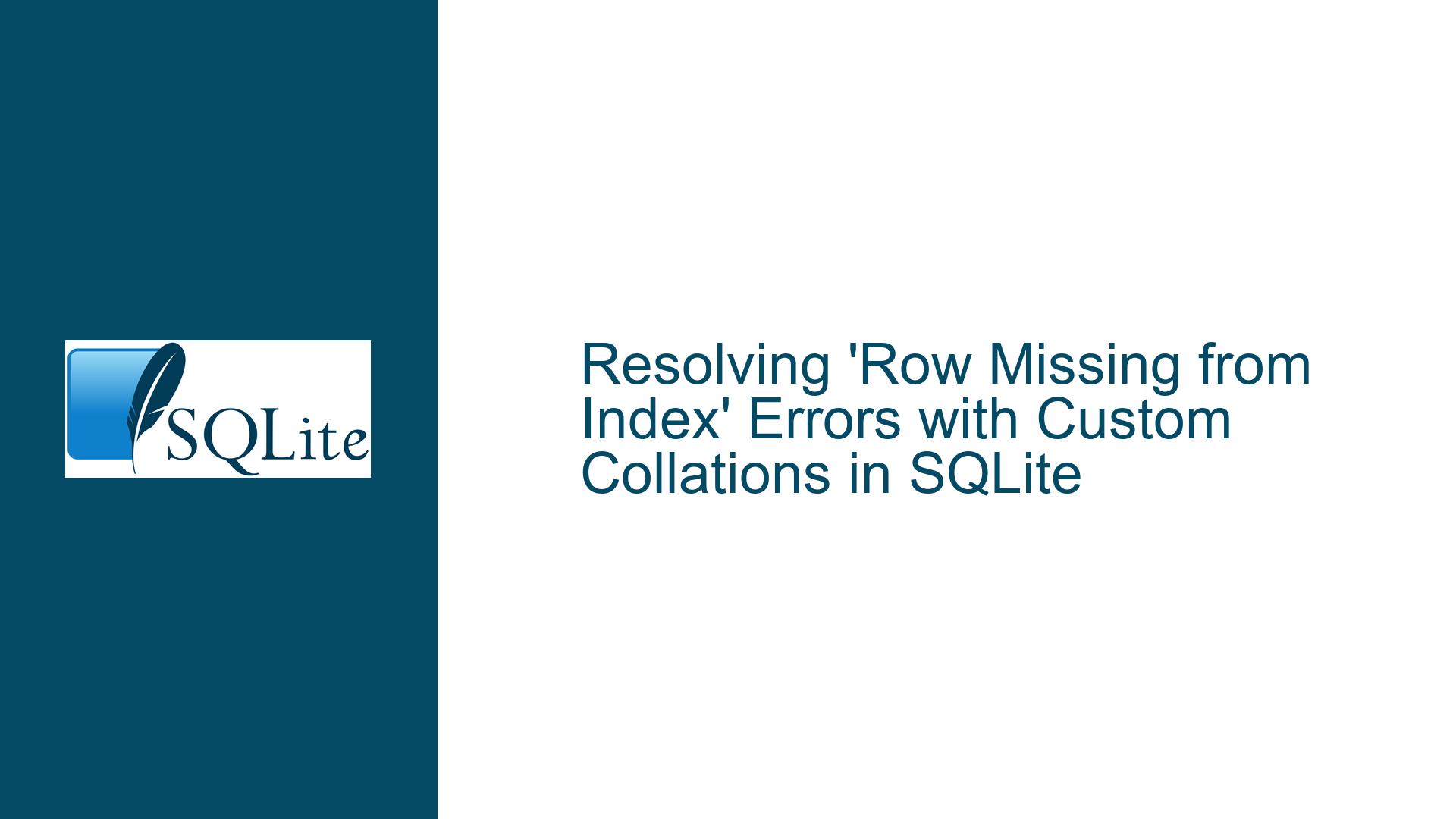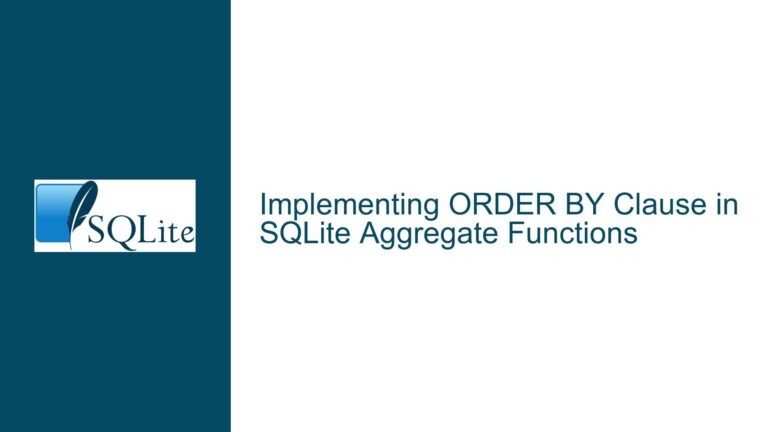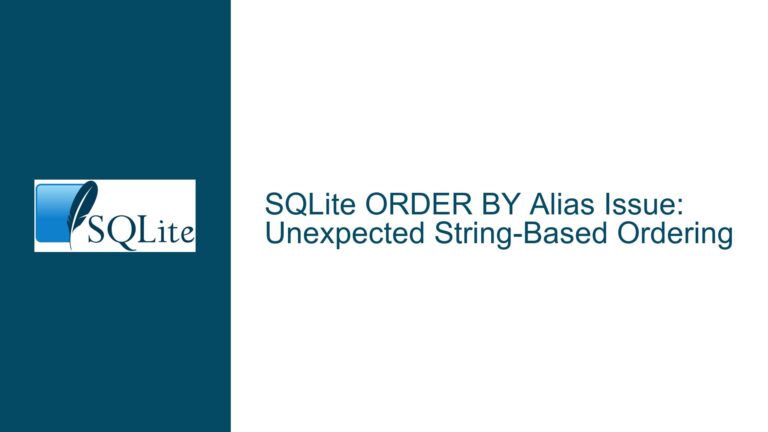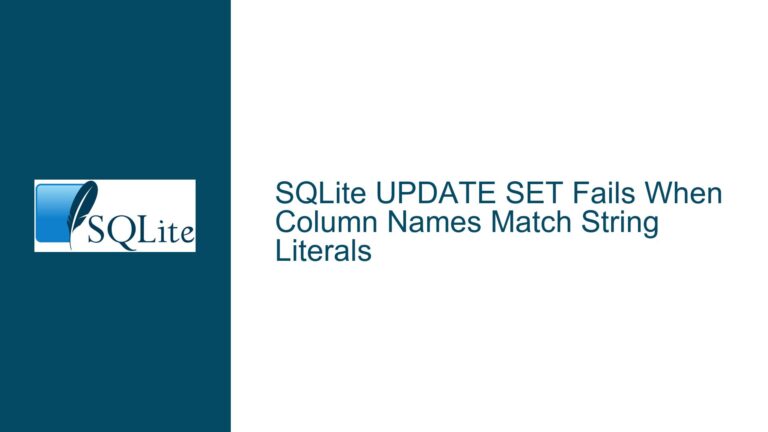Resolving ‘Row Missing from Index’ Errors with Custom Collations in SQLite
Issue Overview: Collation Mismatch Causing Index Integrity Failures
The core issue revolves around custom collation sequences in SQLite leading to index integrity errors (row X missing from index) when the database is accessed by third-party tools or applications that lack the custom collation logic. This problem arises when a developer attempts to implement accent-agnostic and case-insensitive sorting/searching for French text. The custom collation overrides the default NOCASE collation to achieve locale-specific sorting and indexing. However, when the database is opened by external tools that do not have access to the custom collation function, the index traversal logic breaks because the collation rules used to build the index differ from those used during integrity checks or queries. This results in mismatches between the table data and its associated indexes.
The crux of the problem lies in SQLite’s reliance on collation consistency. Indexes are B-Tree structures where entries are ordered according to the collation rules defined during their creation. When a query or integrity check is performed, SQLite uses the same collation to traverse the B-Tree. If the collation function is unavailable or inconsistent (e.g., replaced by a different implementation), the traversal logic fails to locate the expected entries, triggering integrity errors. This is exacerbated when the collation overrides a built-in collation like NOCASE, as third-party tools may assume the default behavior, leading to silent failures in index validation.
Possible Causes: Collation Inconsistencies and Encoding Errors
Custom Collation Overrides Without Portability
Overriding built-in collations (e.g.,NOCASE) with custom logic creates a hidden dependency. External tools that open the database will use the default collation rules forNOCASE, which do not account for accent insensitivity. This mismatch between the index’s collation (custom) and the tool’s collation (default) causes the B-Tree traversal to fail duringPRAGMA integrity_check, as the index entries are ordered according to rules the tool cannot replicate.Non-UTF-8 Data Corruption
Invalid or mixed character encodings (e.g., Windows-1252 data stored in UTF-8 columns) can corrupt collation results. Collation functions like ICU rely on valid UTF-8 input. If strings contain malformed bytes or legacy encodings, the collator may return inconsistent comparison results, leading to index entries that appear misplaced during integrity checks.Function-Based Indexes with Missing Dependencies
Indexes created using custom SQL functions (e.g.,transliterate_to_ascii(name)) require those functions to be available at runtime. Third-party tools lacking these functions will fail to read or update the database, and even simple queries may trigger errors. Worse, such indexes may be silently ignored, forcing full table scans.Suboptimal Query Patterns
Queries usingLIKEwith leading wildcards (%médéric%) inherently bypass index optimizations, requiring full scans. When combined with custom collations or functions, this exacerbates performance issues and increases the likelihood of collation mismatches during index traversal.
Troubleshooting Steps, Solutions & Fixes
Step 1: Validate and Normalize Input Data Encoding
Before addressing collation issues, ensure all text data is valid UTF-8. Malformed encodings can corrupt collation results. Implement pre-processing steps to detect and convert non-UTF-8 strings:
// Example PHP sanitization for imported data
$str = !preg_match('//u', $str) ? utf8_encode($str) : $str;
This ensures strings passed to collation functions are UTF-8 compliant. For bulk fixes, run a migration:
UPDATE names SET name = CAST(name AS BLOB); -- Force binary representation
UPDATE names SET name = utf8fix(name); -- Hypothetical function to repair encoding
Step 2: Avoid Overriding Built-In Collations
Instead of hijacking NOCASE, register a new collation (e.g., FRENCH_AI for accent- and case-insensitive). While this requires third-party tools to support custom collations, it prevents silent integrity failures:
CREATE INDEX names_name ON names (name COLLATE FRENCH_AI);
If portability is critical, use a separate column to store normalized versions of the text:
ALTER TABLE names ADD COLUMN name_normalized TEXT;
UPDATE names SET name_normalized = transliterate_to_ascii(name);
CREATE INDEX names_normalized ON names(name_normalized);
Queries then target name_normalized, and indexes remain valid across all tools.
Step 3: Use Function-Based Indexes with Caution
If custom collations are not portable, create indexes on computed columns. SQLite allows this if the function is deterministic and available at index creation:
CREATE INDEX i0 ON names(transliterate_to_ascii(name) COLLATE NOCASE);
However, this requires the transliterate_to_ascii function to be present in all environments. To mitigate, document the dependency and provide fallback views for third-party tools:
CREATE VIEW names_search AS
SELECT id, name, transliterate_to_ascii(name) AS name_ascii FROM names;
Step 4: Leverage SQLite’s ICU Extension
If the environment allows, compile SQLite with the ICU extension for standardized Unicode collation. This provides consistent, language-specific sorting without custom code:
SELECT icu_load_collation('fr_CA', 'FRENCH_AI'); -- Hypothetical ICU setup
CREATE INDEX names_name ON names (name COLLATE FRENCH_AI);
This approach requires distributing a custom SQLite build but ensures collation consistency.
Step 5: Repair Index Integrity
When integrity errors persist, rebuild indexes using the correct collation:
REINDEX names_name;
For third-party tools, provide a script to reindex the database upon opening:
-- Save as 'reindex.sql'
REINDEX;
Execute via sqlite3 database.db < reindex.sql.
Step 6: Optimize Query Patterns
Avoid LIKE with leading wildcards. Instead, use full-text search (FTS5) for accent- and case-insensitive searches:
CREATE VIRTUAL TABLE names_fts USING fts5(name, tokenize='unicode61 remove_diacritics 2');
INSERT INTO names_fts SELECT name FROM names;
SELECT * FROM names_fts WHERE name MATCH 'mederic'; -- Returns all accents/cases
FTS5 handles diacritic removal and case folding internally, with efficient indexing.
Final Recommendations
- Prefer Normalized Columns for portability and compatibility.
- Validate Encodings Rigorously to prevent collation corruption.
- Avoid Collation Overrides unless strictly controlled.
- Document Dependencies for third-party users.
- Use FTS5 for complex text search requirements.
By addressing encoding issues, avoiding collation overrides, and leveraging SQLite’s extensibility, developers can achieve accent- and case-insensitive operations without sacrificing index integrity or portability.






